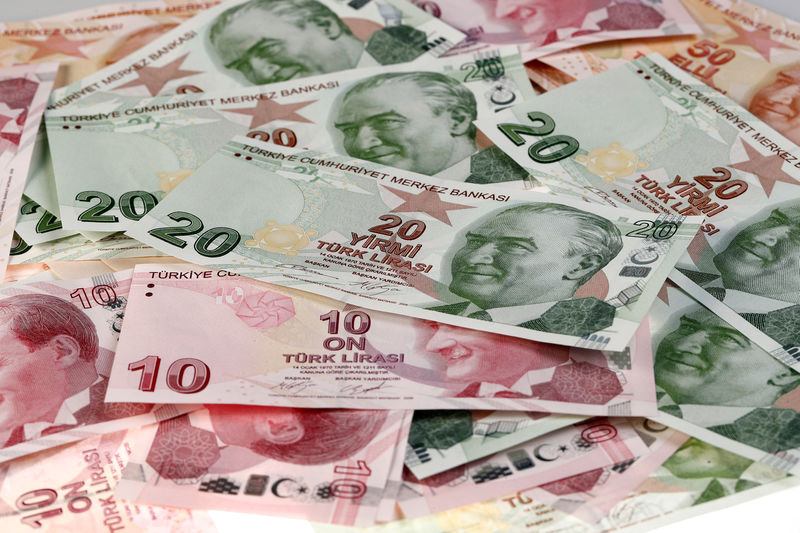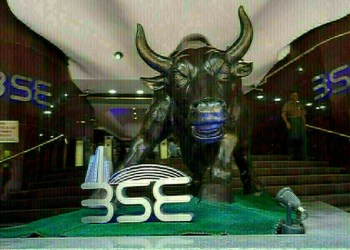 © Reuters. FILE PHOTO: Turkish Lira banknotes are seen in this picture illustration
© Reuters. FILE PHOTO: Turkish Lira banknotes are seen in this picture illustrationBy Ece Toksabay
ISTANBUL (Reuters) – Serap, a 23-year-old clerk at a clothes store in central Istanbul, is sure of who to blame for the precipitous slide in Turkey’s lira currency.
“This crisis is created by America,” she said.
The lira has lost more than 35 percent against the dollar this year and hit a fresh low on Friday, its biggest one day fall since Turkey’s 2001 financial crisis.
Food, rents and fuel prices in Turkey have all surged. The state pipeline operator last week raised the price of for electricity production by 50 percent.
Serap’s sentiments about the causes of the crisis are shared by many Turks and hint at why support for President Tayyip Erdogan, who won re-election in June with super-charged presidential powers, looks untouched, at least for now.
His loyal supporters see the currency sell-off as a U.S. attempt to undermine their country and president.
“If they have their dollars, we have our people, our God,” Erdogan said in a speech overnight, casting the lira’s slide as a campaign against the nation.
The comments dominated Turkey’s overwhelmingly pro-government media on Friday. Newspapers and TV stations have cast the lira crisis as a political assault, spiraling out of U.S. sanctions imposed on two Turkish ministers last week in a row over the detention of a U.S. evangelical pastor, Andrew Brunson.
“They issued a scandalous decision last week about our ministers,” said Serap, the store clerk. She didn’t know exactly what steps Washington had taken against Turkey, but said her country would not be pushed around.
“It’s not so easy to make us bow down to their demands.”
Opposition newspaper Sozcu this week showed Brunson, still under house arrest in western Turkey, launching a $100 note folded up as a paper plane.
The lira sell-off, driven by fears about Erdogan’s influence over monetary policy and Turkey’s worsening relations with the United States, has sent tremors through global emerging markets and dominated international financial headlines.
But the Turkish media has largely ignored the crisis, aside from covering Erdogan’s comments.
“The newspapers didn’t even report the natural gas and electricity price raises,” said Veysel, an Istanbul taxi driver. He said he learns about the slumping lira and steep fuel price rises when he fills up his tank or quizzes his passengers, rather than from the media.
For a graphic on emerging market currencies slide, click https://tmsnrt.rs/2vzelu5
“AMERICAN” CRISIS
Relations between Ankara and Washington have collapsed over the last year.
Further U.S. measures are expected if the two NATO allies fail to resolve the Brunson dispute, as well as wider differences over issues including U.S. sanctions on Iran and Ankara’s plans to buy a Russian missile defense system.
Erdogan has bitterly chastised the United States for failing to extradite a U.S.-based cleric Ankara blames for a failed 2016 coup, supporting a Kurdish militia in northern Syria which Turkey says is a terrorist organization, and for demanding its allies comply with U.S. sanctions on Iran.
“They are ruling the world on their own,” said Yilmaz Cakarli, a trader in Istanbul. “Somebody must find a solution and say ‘stop’ to the United States.”
That defiance echoes the world view of Turkey’s president, who has overseen rapid growth during his 15 years in power. Turkey has become one of the world’s top 20 economies and witnessed massive infrastructure development, including new roads, bridges and hospitals under Erdogan.
But with inflation at a 14-year high and still rising, its most powerful leader since Ataturk has resisted the orthodox policy response of raising interest rates, which he once described as the “mother and father of all evil”.
Last month the central bank left its policy rate unchanged, surprising economists who had predicted a significant hike. In the fortnight since, the lira has lost more ground.
“A STRONG TURKEY”
Some Turks lay blame closer to home.
“They are taking all of us to the cliff-edge,” said a 35-year-teacher, buying a phone charger in an Istanbul mall. She declined to be named for fear of being seen to criticize a president who brooks little dissent.
Erdogan’s supporters see less cause for alarm.
“The government knows what it’s doing – the crisis rumors are creating false panic,” said Ahmet, a 30-year-old selling newspapers and cigarettes at a kiosk in Istanbul.
“I think it’s good the newspapers aren’t making a big deal out of this. What good would it serve other than creating more panic? The government will do something when it’s necessary.”
Levent, who owns a shop selling mobile phone accessories, said Turkey’s standing in the world was more important than the lira, and fears of a currency collapse were overblown.
“The dollar has gone beyond 5 (lira), yes. But we didn’t vote for the dollar, we voted for a strong Turkey,” he said, referring to Erdogan’s June election victory.
“Look – everyone has cars, there’s busy 24-hour traffic in this city. Does this look like a city in crisis?”
Source: Investing.com



























